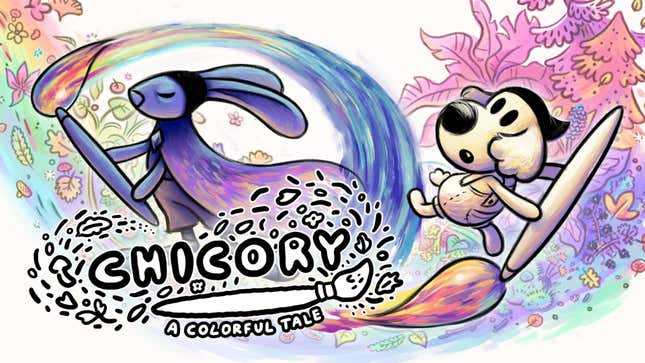
Chicory: A Colorful Tale is special in the same way that Undertale was special. Both games disarmed you with their charm and humor before murdering you with a story full of warmth, love, and knee-shattering poignance. Chicory could not have come at a better time for people who need to learn how to be kind to themselves and gracious to others.
Chicory is a game about a tanuki (who, critically, is not the titular character) who lucks into a magical brush capable of painting the world in all sorts of colors. Then, as bad luck would have it, all the color in the world mysteriously disappears, leaving your character charged with restoring color to the world. But what starts as a standard, epic video game quest takes a turn into something more personal and heartfelt than just saving the world.
At first brush (heh), Chicory seems like your typical feel-good indie game. It’s got a cutesy art style and a relatively simple gameplay mechanic where you use your brush to fill in all the blank spaces in the world with an assortment of colors. But in reality, Chicory is a masterfully designed surgical laser of a game designed to strip away all the defensive layers of your soul, leaving you with your deepest insecurities and the desire to do something about them while still managing to be a fun platformer romp.
There’s a trap some games have fallen into lately in which they acknowledge the very real mental health struggles that seemingly plague millennials and Gen Z. A game will make a wry joke or funny reference in a way that feels fitting for a quick screencap to be shared on social media with captions like “Mood,” or “Ouch,” or “Too real,” before it’s back to business. That moment of reflection is completely forgotten. Or, conversely, a game will heap on misery after misery in service to “capturing the truth of real life.”
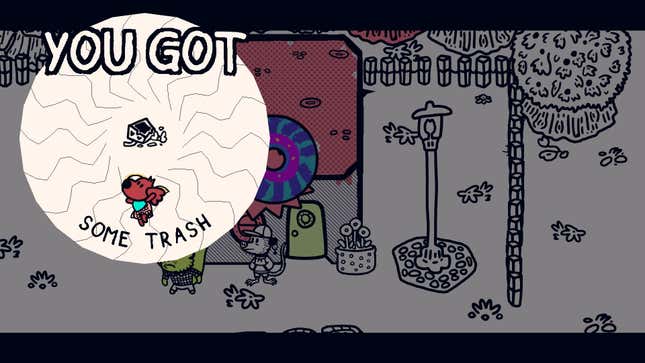
Chicory strikes a well-maintained balance between those extremes. It acknowledges that the world is fucked up, and we are too, while not being so depressing that it makes you want to hide under your blankets forever. Every time my tanuki Pizza interacted with the cutesy animal citizenry we would have frank and meaningful, but never oppressive, conversations about depression, anxiety, and that relentless bitch impostor syndrome.
Chicory is a kind of Metroidvania but, outside of boss fights, there is no combat. You solve environmental puzzles with your brush powers in order to progress the story. The puzzles are simple but challenging enough to be rewarding. The true challenge lies in gathering all the collectibles. There are hidden areas to explore, missing children to find, clothing to collect, and brushes to acquire, requiring you to use all your brush powers and platforming skills. Finding all the collectibles unlocks a number of perks that allow you to decorate your house, dress to the nines, or paint increasingly complex masterpieces.
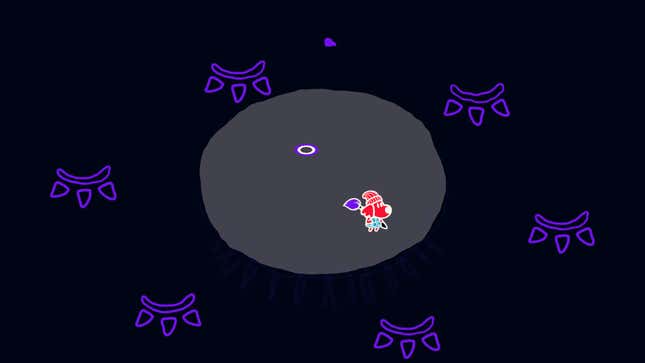
Boss fights are fun, but sometimes they go on for a touch longer than they need to. In each fight, your character had to dodge paint attacks. But every time you fight a new boss, the game switches it up, introducing a new twist on the paint dodging mechanic that made me breathlessly whisper, “No fucking way,” impressed by the sheer creativity of the encounter.
Chicory is unique with its settings and systems designed to assist your play. You can tell the devs were mindful about accessibility. There’s a setting to turn off the sounds paint makes when you splatter it everywhere to help the folks with misophonia or anyone who simply doesn’t like the wet, squelching noises. There’s also a robust hint system that will give you slight clues or outright tell you how to proceed in case you get stuck. I appreciated this in-game hint system because, let’s face it, I’m getting old. Sometimes I just don’t have the patience to figure out how to progress, and looking up walkthroughs is a pain, or in this case, nearly impossible since the game’s so new.
Though coloring is the main gameplay component of Chicory, I never felt compelled to fill in the blank and empty world, and I’m glad the game doesn’t seem to punish you for not doing so. I’m also glad the game doesn’t care if you’re an artist while allowing artists a chance to show off their talents with its blank canvases of opportunity. With a deft hand and all the different brush styles, there’s no limit to what you can create in Chicory.
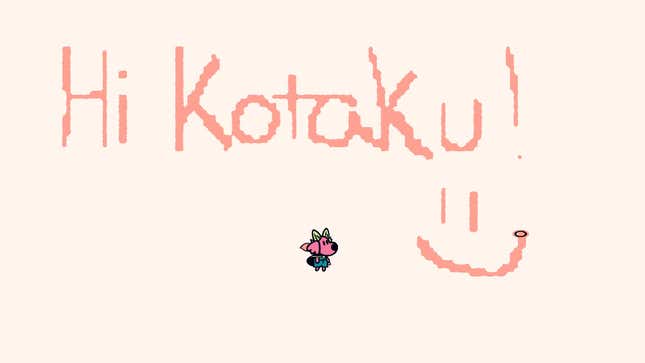
Throughout the game, I wondered why you didn’t play as the titular character. Chicory is not you but is instead your idol. Before you came to wield the brush, it belonged to her, and it was her job to paint the world. But as I went through the game, the conversations I had with Chicory began to strike too uncomfortably close to home. Chicory, by achieving the position of Wielder, accomplished her dream. To your character, she’s perfect, so why isn’t she happy? Why does she talk down to herself, hate herself, and ultimately lash out at people who only want to help her? The choice to play as someone else feels deliberate on the devs’ part.
Playing as Chicory, it would have been too easy to dismiss her feelings, just as I dismiss my own feelings whenever I feel sad or worthless. We will often enthusiastically support our friends dealing with mental health struggles, but—just as often—we fail to save any of that kindness or patience for ourselves. By playing as someone other than Chicory, as a character who unreservedly supports their idol, the game reminds me to be gentle with myself, the way Pizza is gentle with Chicory.
The game also doesn’t let anyone off the hook. Too often, characters who have done wrong, even for understandable reasons, are forgiven without having done anything to truly earn forgiveness. Chicory acknowledges the dual realities that people struggling with mental health issues will hurt the people they love without using that mental illness as an excuse for any pain inflicted.
Chicory hurts Pizza even though she doesn’t mean to, and Pizza understands that. But rather than having Pizza simply forgive Chicory and having everyone move on, Chicory apologizes and promises to do better and follows up on that promise with action. If you ever needed to know how to repair a relationship after a seemingly unforgivable rift, a couple of hours with Chicory will show you how.
Watching those difficult conversations unfold between Chicory and Pizza felt authentic. They’re two messy humans (well, two messy talking animals) being messy together.
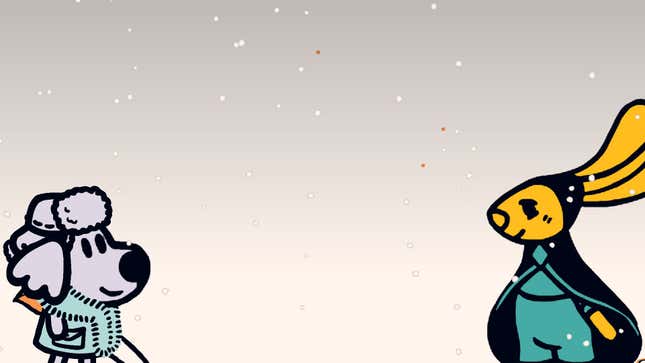
I don’t want the game to end. Even after Chicory and Pizza patch things up and save the world together, I still want to continue exploring the world, solving colorful challenging puzzles.
Chicory is a devastating game, and I mean that in the most affectionate way I can. Its playful art style and infinitely replayable music conceal a heart-wrenchingly relatable story that’ll cut you 1,000 times before you realize you’re bleeding. But at the same time, Chicory will uplift you and remind you that even though things are bad, and you feel like you’re beyond hope, that help is never as far away as it seems.




